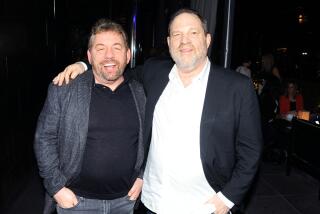Porn Charges Dropped; No Offense to L.A.’s Morals : Area Too Diverse, Judge Says
- Share via
In a setback for the federal government’s campaign against major distributors of pornography, a judge today dismissed racketeering charges against a Woodland Hills video distributor, saying he could not find that the graphic films he sold violated community standards.
Granting an acquittal in the only Los Angeles case brought in the Justice Department’s crackdown on obscenity, U.S. District Judge David V. Kenyon said he could not conclude that films such as “Kneel Before Me” and “Beyond DeSade” were “patently offensive” in an area as diverse as Los Angeles.
“The great majority of people in this town would be incensed by this,” the judge stated in his oral decision. “I just do not believe that unless you have positive evidence of what the entire community believes in this area, that any judge could say what goes on in the so-called edge of this area, whether it’s obscene, or (merely) pornographic.”
Defense lawyers said the decision may make it more difficult for prosecutors to bring obscenity cases in metropolitan areas. “In a way, what the court did, which is of nationwide significance, is call into question the Supreme Court’s assumption that you can tell if material is patently offensive just by looking at it,” defense attorney Stanley Fleishman said. “The historic fact as I see it is that in America today, the American people tolerate virtually any sexual material.”
4th Case in Nation
The case against Rubin Gottesman, owner of X-Citement Video Inc. and R. G. Sales Co. in Van Nuys, was the fourth obscenity case in the nation to be filed under federal racketeering laws, which allow prosecutors to seize the assets of distributors.
Under the statute, prosecutors had sought to seize Gottesman’s Woodland Hills home, his stock and ownership interests in both companies, his personal and corporate bank accounts and office furniture and equipment.
The indictment was one of a series returned in a campaign prompted in part by the 1986 report of a Justice Department commission that found a link between some sexually explicit material and violence.
The four films alleged to be obscene in this case included graphic depictions of group sex, oral sex, beatings and bondage. One included a gang rape scene in a mental hospital.
The Supreme Court has held that only materials that are “patently offensive” when measured against community standards and that appeal primarily to “prurient interests” can be adjudged obscene. But the defense argued that in metropolitan areas such as Los Angeles, it is virtually impossible to determine what may be offensive to the entire community.
Prosecutors presented one expert witness who testified that materials such as those cited in the indictment are not readily available on video shelves in Los Angeles, an indication, perhaps, that even regular purveyors of pornography consider them outside the scope of most films. But Kenyon said that may only indicate that distributors “ would say it’s not worth the risk” of potential prosecution.
More to Read
Sign up for Essential California
The most important California stories and recommendations in your inbox every morning.
You may occasionally receive promotional content from the Los Angeles Times.













